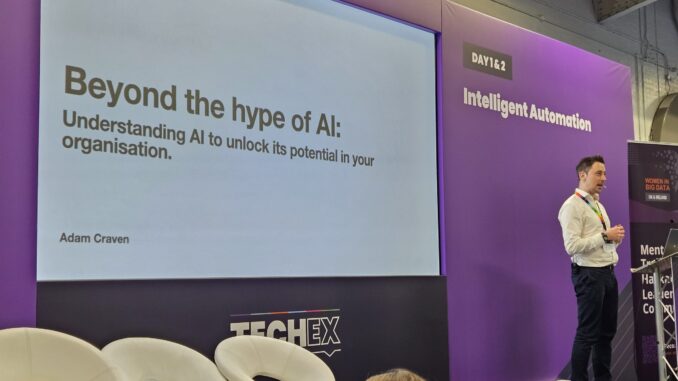
[ad_1]
In a presentation at AI & Big Data Expo Global, Adam Craven, Director at Y-Align, shed light on the practical applications of AI and the pitfalls often overlooked in the hype surrounding it.
Craven — with an extensive background in engineering and leadership roles at McKinsey & Company, HSBC, Nokia, among others — shared his experiences as a consultant helping C-level executives navigate the complex landscape of AI adoption. The core message revolved around understanding AI beyond the hype to make informed decisions that align with organisational goals.
Breaking down the AI hype
Craven introduced a systematic approach to demystifying AI, emphasising the need to break down the overarching concept into smaller, manageable components. He outlined key attributes of neural networks, embeddings, and transformers, focusing on large language models as a shared foundation.
Neural networks — described as probabilistic and adaptable — form the backbone of AI, mimicking human learning processes.
Embeddings allow computers to navigate between levels of abstraction, somewhat akin to human cognition.
Transformers — the “attention” mechanism — are the linchpin of the AI revolution, allowing machines to understand context and meaning.
LLMs as search and research engines
Craven assesses if LLMs alone make good search engines. They understand search intent exceptionally well but don’t have access to vast data, give accurate results, or reference sources—all of which are key search requirements.

However, Craven highlighted that large language models (LLMs) are powerful summarising engines for research. He emphasised their ability to summarise data, translate between languages, and serve as research assistants:

Craven went on to caution against relying solely on LLMs for complex tasks—showcasing a study where consultants using language models underperformed in nuanced analysis.
De-hyping AI: Setting realistic expectations
The presentation concluded with practical use cases for organisations, such as documentation tools, high-level decision-making, code review tools, and multimodal decision-makers. Craven advised a thoughtful evaluation of when LLMs are useful, ensuring they align with organisational values and principles.
However, Craven warns against inflated claims about AI’s performance—citing examples where language models enhanced certain tasks but fell short in others. He urged the audience to consider the context and nuances when evaluating AI’s impact, avoiding unwarranted expectations.
Craven offered actionable insights for implementation, urging organisations to capture data for future use, create test cases for specific use cases, and apply a systematic framework to develop a strategy. The emphasis remained on seeing through the hype, saving millions by strategically incorporating AI into existing workflows.
In a world inundated with AI promises, Adam Craven’s pragmatic approach provides a roadmap for organisations to leverage the power of AI while avoiding common pitfalls.

Want to learn more about AI and big data from industry leaders? Check out AI & Big Data Expo taking place in Amsterdam, California, and London. The comprehensive event is co-located with Cyber Security & Cloud Expo and Digital Transformation Week.
Explore other upcoming enterprise technology events and webinars powered by TechForge here.
[ad_2]
Source link





Be the first to comment